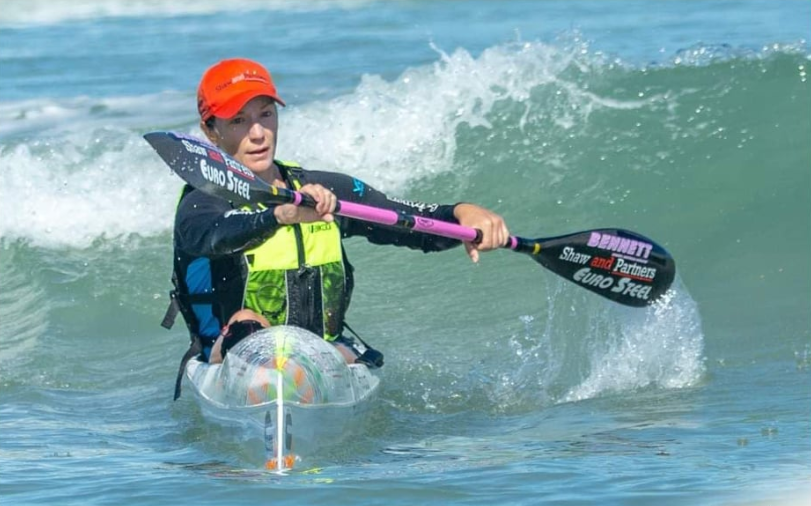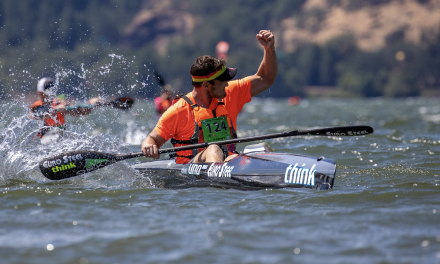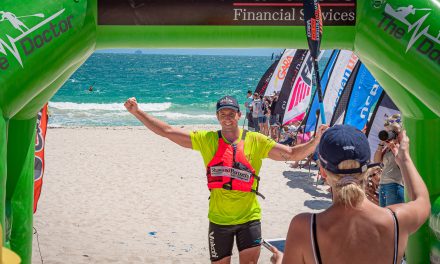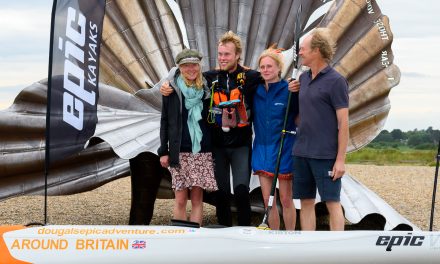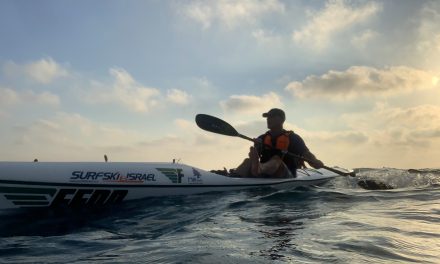NEW FOCUS FOR NIXON AS FAMILY COMES FIRST
Hayley Nixon has never been happier to miss a season of racing.
It’s not through injury though. And unlike her contemporaries, it’s not because of COVID-19.
Instead, come November, she and partner Paul will become parents for the first time.
“We’re ecstatic,” she says.
“It’s something we’ve been wanting to do but decided together that we had some goals we wanted to achieve first.”
“I think something just clicked last year and we felt like it was a chapter that we had to prioritise.
“To be honest, we thought we would give it a try this year, but we’re very grateful it only took one try!” She laughs.
Those goals took them around the world in what Nixon describes as two of the most incredible years of her life.
But few are aware of the sacrifices she was forced to make for it to materialise.
After winning the ICF World Championship in 2017, Nixon found herself on a platform like never before – and she was determined to harness it to make a difference.
“Women’s racing was good even though the numbers were still quite small, but with respect, I don’t know how seriously we were taken,” she recalls.
“I just felt like we had so much more potential to be recognised as equals, to race more and just for the women’s sport to grow.
“It just became my little passion project to fight for equality.”
“Most of the events when I was racing internationally had all of the money in the men, and just a couple of things and a bottle of wine in the women.”
The tide turned fast. Some of the world’s biggest events soon posted equal prize money for both men and women, while race teams sat up and took notice. Shaw and Partners in particular, of which Nixon is an ambassador, has lead the way in that area.
“Earl [Evans, of Shaw and Partners] offering to fly us to Molokai was just a total fairytale. The fact we went and we won, we thought, ‘we’ve actually been a good investment for them.’”
“After that people expected us to be at races being the World Champ and the Molokai Champ.”
But making that decision wasn’t straight forward. Nixon is a biokineticist, a clinical exercise specialist. Pursuing this once-in-a-lifetime opportunity to travel the world and race would mean quitting her job – not to mention putting plans for a family on hold.
“We knew it was going to take a lot of sacrifices and some tough months to pay the bills, but we thought we wouldn’t regret that. We knew it could be two of the best years of our life,” she says.
“I realised if I could get on the podium a few times a year, I might actually match or better my salary.”
“You’re weighing up quality of life versus finances. We thought this kind of experience wouldn’t come when I was 45 or 50. It’s here now.”
“And it sort of became a self-fulling prophecy. It just steam-rolled I guess. We were racing hard and we were having fun travelling the world.
Her racing achievements across this time are simply too long to list, while off the water, Nixon has paved the way for the next generation of female paddlers to thrive under a new standard of equality.
There was a sweet irony to that too. The more she nurtured women’s paddling, the harder it became to win world-class races.
“There’s a certain level of vindication that it paid off,” she admits.
“But I can see now that the stakes are harder and tougher and that’s what we tried to explain to race organisers two years ago.
“If you keep cutting us down, we won’t come back. Now, it’s amazing. And look, we have 10 or 11 women fighting it out for three places and you never know who’s going to win.
“That’s where I got to at the end of last year. I was like, ‘OK, I think we’ve done enough. Before the wheels come off, what have we always wanted? We’ve wanted a family, so it’s time.’
“I am so glad I had those few years because age is also a factor. Turning 37, I want to keep going, but your priorities do have to change.
“I’m so lucky I got in when I did.”
But make no mistake – this is certainly not a retirement speech. She admits it’s a question she’s been asked a lot since sharing her pregnancy news, but not one she’s actually considered herself – or saw the need to.
“Michelle Burn is probably still the best downwind paddler I know and she’s had two kids,” Nixon says.
“I don’t have to make that decision here. How would I know? I still think I’m going to paddle, I still want to.
“But who’s to say I don’t move into more of a coaching, commentating or more of an ambassador rule?”
“It’s a hard one to answer, and I think that’s what is so intimidating as an athlete who is current and wants to have a family. You get so boxed, and it’s so easy to be written off and then that becomes very, very daunting.
“I think it all comes down to personal choice. Do you want to go back? Or are you fulfilled and ready for a new chapter? I guess we’ll find that out.”
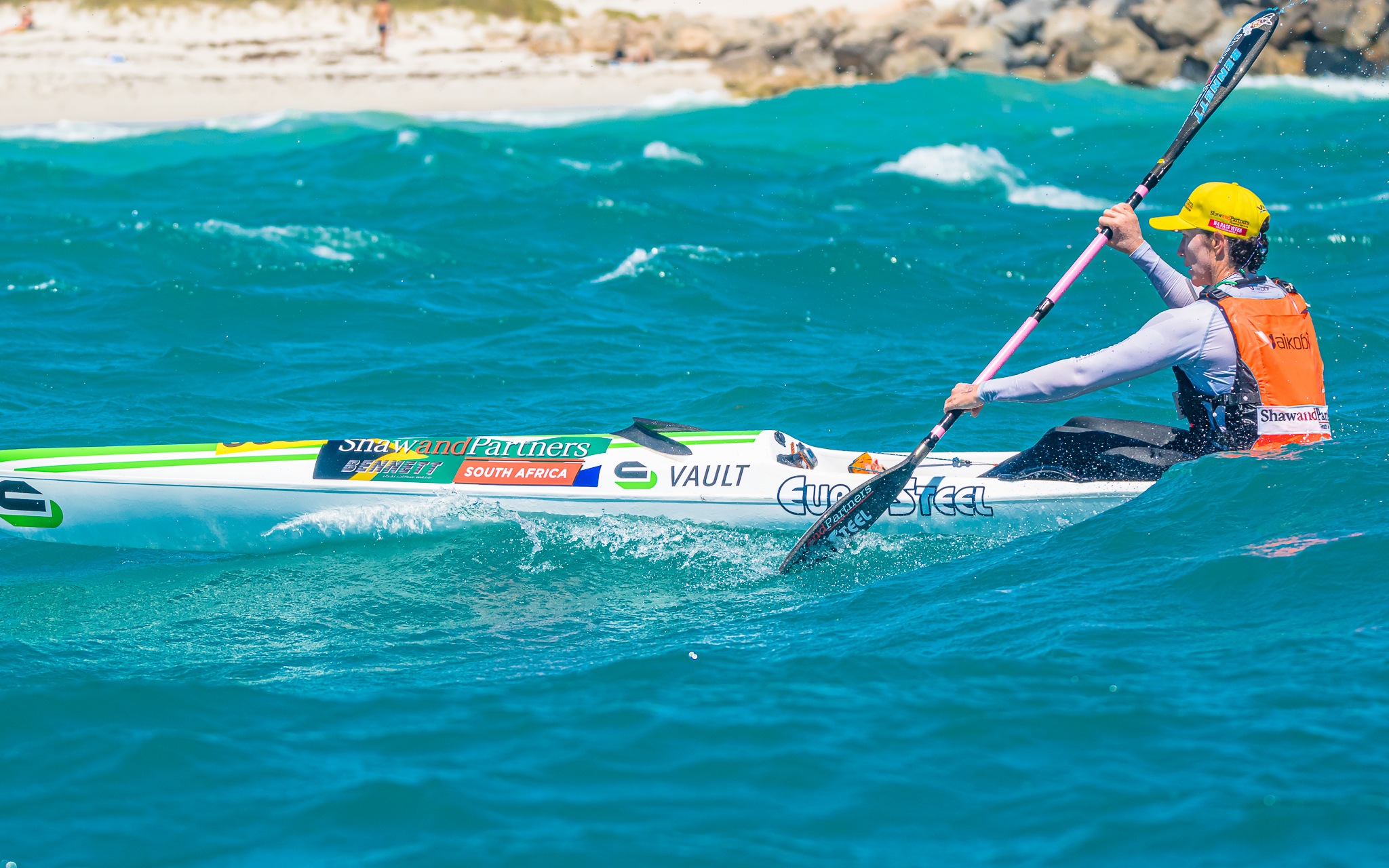
The competitive fire still burns. She admits the challenge of lining up against her younger counterparts is one that’s already formed in the back of her mind. The performances of athletes like Hank McGregor, Dean Gardiner and Oscar Chalupsky are a testament to what can be achieved in a sport such as surfski that can rely so heavily on skill.
But there’s another thought that excites her even more than that, and one which the majority of paddlers can resonate with.
“I don’t think athletes realise this enough – there’s nothing wrong with being satisfied with your career and just doing it for fun.
“It’s very easy to think you’re never allowed to lose and there’s a lot of pressure to think you can’t have any excuses about getting old or just wanting to have fun.”
“I think about going back to Molokai in a double with some junior who wants someone experienced to take them along. That kind of stuff really excites me and it really attainable and might actually add more value than necessarily going there trying to win.”
A mindset that can only be borne out of a career that holds no regrets.
“Oh, I wouldn’t change it for a second,” she says.
“I feel incredibly lucky to have come into the sport and done those performances at those times. There’s plenty of female paddlers who are better than me, but they were paddling five years ago and didn’t have these opportunities.
“It wasn’t like that five years ago and who knows what it will be like in the next five years.
“It’s certainly been a pretty sweet time to get involved and have the opportunities I’ve had.”

